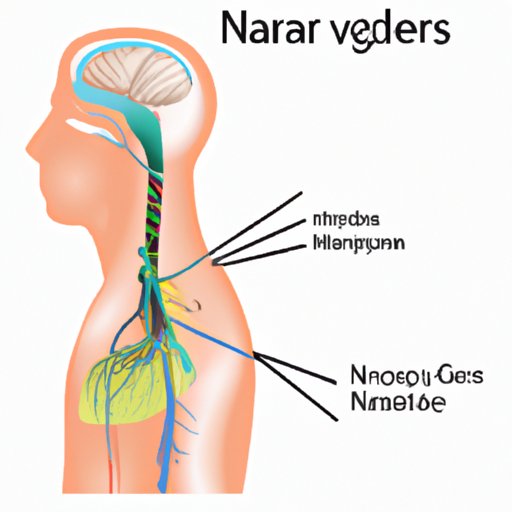Introduction
The vagus nerve is the longest nerve in the body, running all the way from the brainstem down to the colon. It plays a critical role in controlling essential functions such as heart rate, digestion, and breathing. Sometimes known as the “wandering nerve,” the vagus nerve also helps to regulate involuntary bodily responses, like sweating and digestion.
Given the important functions it controls, proper vagus nerve function is essential for good health. Unfortunately, this nerve can become damaged due to various causes, leading to a range of health problems.
Causes of Vagus Nerve Damage
There are many different causes of vagus nerve damage, including:
Autoimmune disorders
Autoimmune disorders are conditions where the immune system mistakenly attacks healthy cells in the body. Some autoimmune disorders, such as Sjogren’s syndrome or lupus, can affect the vagus nerve.
Infections
Infections such as Lyme disease, HIV, and herpes simplex virus can lead to nerve damage. Bacterial infections like tetanus can also damage the vagus nerve.
Trauma or surgery
Injury from surgery or trauma, such as from a car accident, can also damage the vagus nerve. Injuries to the neck area are especially risky for damaging this nerve.
Diabetes
Diabetes is a chronic condition that occurs when the body cannot regulate blood sugar. Over time, high blood sugar can damage nerves throughout the body, including the vagus nerve.
Other conditions that can damage the nerve
Other conditions that can damage the nerve include tumors, vitamin deficiencies like B1 or B12, and exposure to toxins like lead or arsenic. Radiation therapy can also cause nerve damage, as can chemotherapy drugs.
A Specific Approach: Gastroparesis and Vocal Cord Paralysis
Definition and explanation of Gastroparesis
Gastroparesis is a condition where the stomach fails to move food through efficiently. This condition can occur due to a range of factors, including nerve damage.
How Gastroparesis affects the vagus nerve
The vagus nerve plays an essential role in moving food through the digestive system. When it becomes damaged, the stomach may no longer contract properly, leading to gastroparesis.
Symptoms patients might experience
Symptoms of gastroparesis include nausea, vomiting, bloating, abdominal pain, and a feeling of fullness.
Definition and explanation of Vocal Cord Paralysis
Vocal cord paralysis is a condition where the muscles that control the vocal cords stop working. This condition can occur due to nerve damage.
How Vocal Cord Paralysis affects the vagus nerve
The vagus nerve plays an essential role in controlling the vocal cords. When it becomes damaged, the muscles that control the vocal cords may stop working correctly, leading to vocal cord paralysis.
Symptoms patients might experience
Patients with vocal cord paralysis may experience hoarseness, trouble speaking, and difficulty swallowing.
Link between Stress and Vagus Nerve Function
Chronic stress can have a significant impact on the vagus nerve. When the body experiences too much stress, the fight or flight response is triggered, leading to inflammation and other negative effects on nerve health.
Chronic stress can lead to conditions like irritable bowel syndrome and anxiety disorders, which can both be related to vagus nerve damage.
Reducing stress is vital for the health of the vagus nerve and overall physical and mental health.
Lifestyle Factors and Vagus Nerve Health
How exercise can improve vagus nerve function
Exercise has been shown to help improve vagus nerve function. Research has found that regular exercise can increase heart rate variability, a marker of good nerve health.
The impact of an anti-inflammatory diet on nerve health
An anti-inflammatory diet rich in nutrients and low in processed foods can also help support the health of the vagus nerve. This diet can help reduce inflammation and provide the nutrients necessary for nerve health.
Other ways to improve overall nerve health
Other ways to improve overall nerve health include getting enough rest and sleep, practicing good posture, and reducing exposure to toxins in the environment.
Strategies for Protecting or Repairing the Vagus Nerve
Discussion of techniques like mindfulness meditation and deep breathing exercises
Techniques like mindfulness meditation and deep breathing exercises can help ease stress and support vagus nerve health.
Use of electrical stimulation to help regenerate nerve fibers
Electrical stimulation has been used to help regenerate nerve fibers. This technique involves passing a current through the damaged nerve to encourage regeneration.
Other possible strategies to protect or repair the vagus nerve
Other possible strategies for protecting or repairing the vagus nerve include supplementation with vitamins and minerals like B12 and magnesium, as well as alternative therapies like acupuncture or massage.
Conclusion
The vagus nerve is a critical nerve in the body responsible for a broad range of functions. Unfortunately, a range of factors can lead to damage to this nerve, including autoimmune disorders, infections, trauma, and diabetes.
Specific conditions like gastroparesis and vocal cord paralysis can also affect the nerve, leading to various symptoms and problems for patients.
Other factors like chronic stress and poor lifestyle choices can also damage the vagus nerve. But by implementing strategies to improve nerve health, patients can potentially protect and even repair their vagus nerve, leading to better overall health and wellness.
(Note: Is this article not meeting your expectations? Do you have knowledge or insights to share? Unlock new opportunities and expand your reach by joining our authors team. Click Registration to join us and share your expertise with our readers.)
